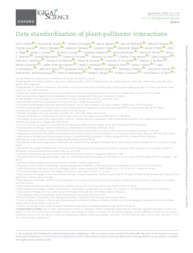Data standardization of plant-pollinator interactions.
Data standardization of plant-pollinator interactions.
Autoria: SALIM, J. A.; SARAIVA, A. M.; ZERMOGLIO, P. F.; AGOSTINI, K.; WOLOWSKI, M.; DRUCKER, D. P.; SOARES, F. M.; BERGAMO, P. J.; VARASSIN, I. G.; FREITAS, L.; MAUES, M. M.; RECH, A. R.; VEIGA, A. K.; ACOSTA, A. L.; ARAUJO, A. C.; NOGUEIRA, A.; BLOCHTEIN, B.; FREITAS, B. M.; ALBERTINI, B. C.; MAIA-SILVA, C.; NUNES, C. E. P.; PIRES, C. S. S.; SANTOS, C. F. dos; QUEIROZ, E. P.; CARTOLANO, E. A.; OLIVEIRA, F. F. de; AMORIM, F. W.; FONTÚRBEL, F. E.; SILVA, G. V. da; CONSOLARO, H.; ALVES-DOS-SANTOS, I.; MACHADO, I. C.; SILVA, J. S.; ALEIXO, K. P.; CARVALHEIRO, L. G.; ROCCA, M. A.; PINHEIRO, M.; HRNCIR, M.; STREHER, N. S.; FERREIRA, P. A.; ALBUQUERQUE, P. M. C. de; MARUYAMA, P. K.; BORGES, R. C.; GIANNINI, T. C.; BRITO, V. L. G.
Resumo: Abstract. Background: Animal pollination is an important ecosystem function and service, ensuring both the integrity of natural systems and human well-being. Although many knowledge shortfalls remain, some high-quality data sets on biological interactions are now available. The development and adoption of standards for biodiversity data and metadata has promoted great advances in biological data sharing and aggregation, supporting large-scale studies and science-based public policies. However, these standards are currently not suitable to fully support interaction data sharing. Results: Here we present a vocabulary of terms and a data model for sharing plant-pollinator interactions data based on the Darwin Core standard. The vocabulary introduces 48 new terms targeting several aspects of plant-pollinator interactions and can be used to capture information from different approaches and scales. Additionally, we provide solutions for data serialization using RDF, XML, and DwC-Archives and recommendations of existing controlled vocabularies for some of the terms. Our contribution supports open access to standardized data on plant-pollinator interactions. Conclusions: The adoption of the vocabulary would facilitate data sharing to support studies ranging from the spatial and temporal distribution of interactions to the taxonomic, phenological, functional, and phylogenetic aspects of plant-pollinator interactions. We expect to fill data and knowledge gaps, thus further enabling scientific research on the ecology and evolution of plant-pollinator communities, biodiversity conservation, ecosystem services, and the development of public policies. The proposed data model is flexible and can be adapted for sharing other types of interactions data by developing discipline-specific vocabularies of terms.
Ano de publicação: 2022
Tipo de publicação: Artigo de periódico
Unidade: Embrapa Agricultura Digital
Palavras-chave: Biodiversidade, Biodiversity informatics, Biodiversity information, Darwin Core, Informação sobre biodiversidade, Informática para biodiversidade, Interação planta-polinizador, Padronização de dados, Polinizador, Polinização, Pollination, Pollinator, Termos de vocabulário, Vocabulary of terms
Observações
1 - Por padrão são exibidas publicações dos últimos 20 anos. Para encontrar publicações mais antigas, configure o filtro ano de publicação, colocando o ano a partir do qual você deseja encontrar publicações. O filtro está na coluna da esquerda na busca acima.
2 - Para ler algumas publicações da Embrapa (apenas as que estão em formato ePub), é necessário ter, no celular ou computador, um desses softwares gratuitos. Sistemas Android: Google Play Livros; IOS: iBooks; Windows e Linux: software Calibre.
Acesse outras publicações
Acesse a Base de Dados da Pesquisa Agropecuária (BDPA) para consultar o acervo completo das bibliotecas da Embrapa.

